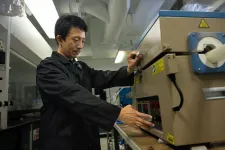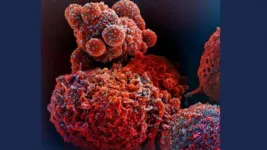(Press-News.org) DURHAM, N.C. – An estimated one life was saved for every 17 times an extreme risk protection order removed guns from people who presented a risk of harming themselves or others, according to a Duke Health-led analysis of the laws in four states.
Extreme risk protection orders -- known as ERPOs or “red flag laws" -- are civil court orders that temporarily prevent people from accessing firearms after a judge determines that they pose an imminent risk of harming themselves or others. Twenty-one states and the District of Columbia have enacted ERPO laws, mostly in recent years.
A growing body of evidence shows that this legal tool can save lives, while also respecting the rights of gun owners. The current study, appearing Aug. 20 in the Journal of the American Academy of Psychiatry and the Law, was the largest study to date.
“This analysis provides important information for making the case that ERPOs can save lives,” said lead author Jeffrey Swanson, Ph.D., professor in the Department of Psychiatry and Behavioral Sciences at Duke University School of Medicine. “These laws do not affect private gun ownership rights for anyone who is not dangerous and is law abiding, and they are broadly supported by people across the political spectrum.”
Swanson and colleagues analyzed risk orders issued to 4,583 individuals in California, Connecticut, Maryland and Washington, and used death records to identify who among those with ERPOs had died of suicide, and by what method.
The chances of surviving a suicide attempt vary widely depending on the method of intentional self-harm that is available and used. Firearms are far and away the most lethal, with a 90% fatality rate. By contrast, only about 10% of suicide attempts using most other common methods are fatal.
The researchers applied published fatality rates for different methods of self-harm to estimate the number of non-lethal suicide attempts that likely corresponded to the recorded number of suicide deaths by each method.
They used other data to estimate the probability that individuals who survived these attempts with other methods would have used a firearm instead -- and died -- but for the weapon’s removal by an ERPO.
Based on that analysis, the researchers estimated that ERPOs likely contributed to the prevention of approximately 269 suicides over an average observation period of two years per respondent, which translated to one life saved for every 17 ERPOs issued.
“Even if we reduce many of the things that motivate people to injurious behavior, we still live in a society where people have easy access to technology designed to kill efficiently,” Swanson said. “Addressing access to firearms for people who are at risk of harming themselves or others is an evidence-based approach that can save lives.”
Swanson said the research demonstrates a need for more states to adopt ERPOS and to increase their use in states that already have the laws, noting that the laws have wide public support: “Nobody wants dangerous people to have access to guns.”
In addition to Swanson, study authors include April M. Zeoli, Shannon Frattaroli, Marian Betz, Michele Easter, Reena Kapoor, Christopher Knoepke, Michael Norko, Veronica A. Pear, Ali Rowhani-Rahbar, Julia P. Schleimer, and Garen J. Wintemute.
The study received support from the National Collaborative on Gun Violence Research.
###
END
More than 23 million Americans who were granted Medicaid coverage during the COVID-19 pandemic lost their coverage starting in March 2023 after the pandemic was declared no longer a public health emergency. Many likely will not successfully re-enroll on their own given Medicaid’s administrative burden—the frustrations and challenges people often encounter in seeking or complying with coverage.
Now, a study of the so-called Medicaid Great Unwinding by Dr. Simon F. Haeder with the Texas A&M University School of Public Health, ...
Corporate Cup, lunchtime yoga, or even ‘walk and talks’, organisations come up with all sorts of wellness initiatives to encourage people to be more active in the workplace. But before you duck and hide, new research shows that all it takes is 15 minutes and a touch of gamification to put you on the path to success.
Assessing results from 11,575 participants, across 73 Australian, New Zealand, and UK companies, University of South Australia researchers found that a gamified workplace wellness program – the 15 Minute Challenge* - leads to substantial increases in physical activity levels, with 95% of participants meeting (36%) or exceeding (59%) ...
August 20, 2024, Mountain View, CA –The SETI Institute announced that Dr. Nadia Drake is joining the SETI Institute's Board of Directors as an observer. The SETI Institute's board guides its strategic direction, finances, and various committees. As a journalist, Drake will be an active, non-voting member, bringing her broad expertise to the team.
"I am thrilled by this appointment to the SETI Institute's board, which comes at an exciting time for the SETI Institute and for the search for life beyond Earth," said Drake. "For most of my career as a science journalist, I've covered astrobiology ...
COLUMBUS, Ohio – A sweeping study of U.S. youth sports participation over the past 60 years found that there has been a significant increase over time in kids playing organized sports – but particularly among more privileged, educated families.
A national survey found that about 70% of Americans born in the ’90s and reaching age 18 by 2015-16 said they took part in organized sports through recreational, school, or club teams. This finding showed a rather steady increase in organized sports participation across generations. Slightly more than half of those ...
Video available here.
In an effort to reduce the environmental impact of carbon dioxide emissions, a University of Central Florida researcher has developed a new technology that captures carbon dioxide and outputs useful fuels and chemicals.
Yang Yang, an associate professor in UCF’s NanoScience Technology Center, created an innovative device that captures carbon dioxide with a microsurface comprised of a tin oxide film and fluorine layer. The device then extracts gaseous carbon dioxide via a bubbling electrode and selectively converts ...
Opportunistic pathogens are typically benign microbes that can sometimes cause infections in individuals with weakened immune systems or when they gain access to sterile areas of the body. Unlike obligate pathogens, opportunistic pathogens do not depend on host infection or transmission for survival, making it difficult to determine the factors driving the evolution of virulence in these microbes. Nevertheless, given their potential to cause severe infections in immunocompromised patients and the increasing prevalence ...
While the U.S. federal government has clean energy targets, they are not binding. Most economically developed countries have mandatory policies designed to bolster renewable electricity production. Because the U.S. lacks an enforceable federal mandate for renewable electricity, individual states are left to develop their own regulations.
Marilyn Brown, Regents’ and Brook Byers Professor of Sustainable Systems in Georgia Tech’s School of Public Policy; Shan Zhou, an assistant professor at Purdue University and Georgia Tech Ph.D. alumna; and Barry Solomon, a professor emeritus of environmental policy at Michigan Technological University, investigated ...
Sophia Antipolis, 20 August 2024: It’s not long before the global cardiology community converges in London for the European Society of Cardiology (ESC)’s annual gathering, unveiling the latest practice-changing science.
The ESC Press Conference Schedule is now available, detailing the nine press conferences that will take place from Thursday 29 August to Sunday 1 September, and can be accessed in person or online. Accredited journalists will also be able to access embargoed press materials in the digital press area from Thursday 22 August.
Join triallists and ESC spokespersons for eight press conferences on the Hot ...
To evade the human host’s immune response, SARS-CoV-2, the coronavirus that causes COVID-19, uses the machinery of defense cells to induce the expression of unproductive isoforms of key antiviral genes – variant forms of genes that result from disrupted splicing or transcription processes and do not code for functional (protective) proteins. This is a key finding of a study conducted by researchers at the Albert Einstein Jewish Brazilian Hospital (HIAE), the University of São Paulo (USP) and the ...
Irvine, Calif., Aug. 20, 2024 — A team of researchers led by the University of California, Irvine has discovered that an antioxidant found in rosemary extract can reduce volitional intakes of cocaine by moderating the brain’s reward response, offering a new therapeutic target for treating addiction.
The study, recently published online in the journal Neuron, describes team members’ focus on a region of the brain called the globus pallidus externus, which acts as a gatekeeper that regulates how we react to cocaine. ...




